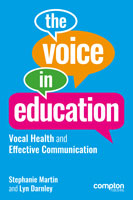The Voice in Education
Vocal Health and Effective Communication
Stephanie Martin and Lyn Darnley
What happens when individuals can no longer effectively, inspire, educate, encourage, explore, exchange ideas or concepts or entertain through the medium of voice?
The Authors, both voice specialists and expert in this realm, previously wrote the acclaimed book, The Teaching Voice (second edition, 2004) and this new book expands on and updates the theme.
Teachers, lecturers, trainers and facilitators are known as professional and occupational voice users. This generic term also applies to many others, from performers to politicians and solicitors to salespeople, where voice is a critical factor of all these professional roles and continued employment is therefore dependent on maintaining vocal effectiveness through diligent vocal care and conservation. In the USA, the teaching profession comprises some 5 million employees. This equates to about 4% of the total workforce, yet educators comprise almost 20% of the patient load in voice clinics. This is reckoned to cost the US economy as much as a $2.5 billion in employee days lost - and this does not include statistics for those teachers who experience voice loss, but decline to report a problem, or seek treatment. Such disproportionately high figures are also mirrored in, in the UK, Europe, Australasia and other countries of the world.
In this book, the authors adopt an integrated approach and offer detailed information on the subject of occupational voice and the vocal demands of the voice user, providing similarly detailed information on the physiology of voice and voice care. Practical advice on aspects of clarity of delivery, communication skills, pedagogic skills, and classroom strategies, supported by exercises for developing the above, are provided. In addition, aspects such as the changing teaching environment, acoustic influences on the voice, illness, stress and anxiety, the ageing voice are explored. Specific qualitative changes such as resonance, as well as range and projection of the voice are included, as are anecdotal personal experiences and challenges from those working in the field.
They offer strategies, solutions and tried and tested practical exercises that will enhance the reader’s current skills and provide a framework to keep them in good voice throughout their professional careers. Also included are a number of class-based practical exercises and suggestions for voice, language and communication work with learners and students from age five to 18. These exercises focus on ideas designed to promote spoken English from simple language games to presentation skills and debating. Containing a number of ‘at-a-glance’ checklists throughout the text and a content section at the end of each chapter, readers will find it an easily accessible resource.
About the Authors
Dr. Stephanie Martin’s career as a Speech and Language Therapist combined clinical practice, research, lecturing, supervision and examining of MA and PhD projects, and writing. Her professional focus of interest lay in occupational voice disorders. She holds an MA in voice studies from the Royal Central School of Speech and Drama. Her doctoral research explored factors, which have an impact on the vocal performance and vocal effectiveness of newly qualified teachers and lecturers. Stephanie is a Past-President of the British Voice Association and in 2005 she was awarded Fellowship of the Royal College of Speech and Language Therapists for research and teaching. Previous publications include Working with Voice Disorders, now in its second edition and VIP: Voice Impact Profile, both co-authored with Myra Lockhart.
Lyn Darnley began her career as a performer and presenter in theatre, television and radio. She is former Head of Voice, Text and Artist Development at the Royal Shakespeare Company. She was previously Head of Voice at Rose Bruford College. She has served as an external examiner on several courses. Her work and her doctoral research has focused on theatre voice and actor training. In 2008 she was awarded the Conference of Drama Schools medal for Services to Actor Training. Her work with teachers includes workshops for the RSC Education Department, University of Michigan and Teachers Groups in the USA and South Africa. She holds an MPhil from the University of Birmingham and a PhD from the University of London. Since retiring from the RSC she has continued to work as a consultant and runs workshops in the UK and abroad, focusing on classic text and presentation skills.
Stephanie and Lyn have been colleagues and friends for many years initially working together offering workshops for teachers under the auspices of the Voice Research Society, Rose Bruford College, and various teacher associations and education authorities. They have co-authored publications on their work with the teachers’ voice and have been invited speakers on this subject at conferences in the UK and the USA.
© Copyright Compton Publishing
